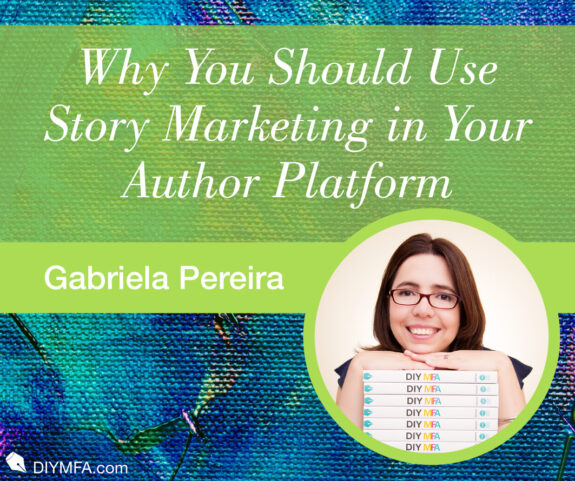Story marketing has been all the buzz for the past several years. More than snappy taglines and fancy graphics, companies have been relying on storytelling to engage their audiences. As writers, we can also do the same with our author platforms, using stories to connect with our readers.
Now, I don’t need to sell you on the idea that stories are important. We are all word nerds here. We already know that stories are important; it’s our job to write them, after all. The thing I want to address today is why stories resonate so deeply. What is it about storytelling that makes it so compelling, so powerful? Here are a few reasons why this might be the case:
1) Storytelling is associated with higher levels of empathy.
There’s a whole area of psychological research that looks at the connection between reading and empathy. In particular, this research shows that people who read fiction have higher levels of empathy than those who read nonfiction. The idea here is that fiction creates something akin to a “life simulator,” allowing readers to engage in experiences that might otherwise be out of their reach.
Reading fiction allows us to step into a character’s shoes and see the world through their eyes. This experience stretches our worldview and increases our ability to empathize with others. When marketers use storytelling in their promotions, they tap into the consumer’s empathy and create an emotional connection between the product and the audience.
2) Story tropes make a narrative feel familiar.
Tropes in storytelling serve as mental shortcuts, allowing us to understand quickly what the story is about. Think of the “Get a Mac” campaign from the early 2000s. In these commercials we have a buttoned-up guy in a suit and glasses as the PC and a relaxed, hipster dude playing the part of the Mac. These commercials tell micro-stories where the rivalry between the two characters plays out. The PC is supposed to be the big, powerful character, and the soft-spoken, chilled-out Mac is positioned as the underdog. People like rooting for the underdog, so it’s easy for the audience to align themselves with the Mac character. The Mac also comes across as more empathetic, where in some commercials he even wants to set their competition aside, but PC continues to show his competitive streak.
This campaign uses an “us vs. them” trope and creates a David and Goliath type of dynamic. We’ve seen this story trope time and again. A seemingly all-powerful villain is thwarted by a humble hobbit and his companions in The Lord of the Rings. A small country school basketball team faces off against a big city school in Hoosiers. And just about every Rocky movie ever made. This trope feels familiar, so when we see a commercial from this “Get a Mac” campaign, we recognize it right away. Immediately we understand what the story is about, with little explanation necessary.
3) Story makes it feel less sales-y.
This past holiday season, I went with my kiddos to Rockefeller Center and to see the windows at Saks. Now, if you’ve ever been to NYC during the holidays, you know that the best windows are always at Saks Fifth Avenue and Macy’s down on 34th street. The thing that makes these windows so great is that they often tell a story. One year, one store showed scenes from The Lion, The Witch and the Wardrobe. Another time, one of these stores did an homage to Rudolph the Red-Nosed Reindeer. For most of the year, these windows are designed to show off the store’s wares, but during the holidays, they take a break from pure promotion and tell a story instead.
That is, until this year. While it pains me to say so, the Saks windows left much to be desired, because they didn’t tell a story. Instead, they had these abstract displays showing products from the store, but there was no narrative, no sense of fun. Sure, there was a fancy intricate lightshow, where at times the whole front of the building was lit up, but that felt empty to me. It was all glitz and glitter without any substance.
You see, without the charming characters and the whimsical story, these windows felt like any other set of store windows on Fifth Avenue. Sure, they promoted the products inside, but the thing that usually made those windows feel special was missing. Not only that, you could tell that the windows didn’t resonate because even the week between Christmas and New Years—one of the busiest tourism weeks of the year—there was no line of people waiting to see the windows. Usually, the lines for these store windows stretch around the block, but this time there was nothing because the windows fell flat, all because there was no story.
When we tell stories, it takes the edge off of the marketing and makes it feel a little bit less salesy. Now don’t get me wrong, our readers aren’t ding-dongs; they still know there’s a promotional angle embedded in the story, but for some reason that angle doesn’t feel quite so sharp. Stories are entertaining, they pique our curiosity and make us want to learn more. When we weave our promotions into a narrative, our audience is more likely to want to hear what we have to say. They are also more likely to remember something that’s told as a story, rather than pure facts and figures.
Why It Matters
Whether we choose to publish traditionally or we go the indie route, we must all face the fact that we need to market our books. Some time ago, social media lit up with readers complaining that writers self-promoted too much. What these readers didn’t understand is that marketing is part of our job as writers, and if we want our work to reach our audience we have to be ready to do some self-promotion. Like it or not, it’s just part of the job.
This is why story marketing is such a game-changer. Not only does it tap into empathy, use tropes to our advantage, and feel less salesy, but it also plays to our strengths. We are writers. Words and stories are our jam. This type of marketing taps into what we do best. So let’s use our storytelling superpowers not only in our writing projects, but also to get our words out into the world and our books in the hands of our readers.
Until next time, keep writing and keep being awesome!

P.S. For more info on Gabriela Pereira, the founder and instigator of DIY MFA, check out her profile page.







